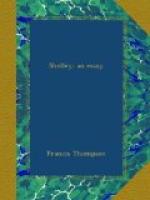We have among us at the present day no lineal descendant, in the poetical order, of Shelley; and any such offspring of the aboundingly spontaneous Shelley is hardly possible, still less likely, on account of the defect by which (we think) contemporary poetry in general, as compared with the poetry of the early nineteenth century, is mildewed. That defect is the predominance of art over inspiration, of body over soul. We do not say the defect of inspiration. The warrior is there, but he is hampered by his armour. Writers of high aim in all branches of literature, even when they are not—as Mr. Swinburne, for instance, is—lavish in expression, are generally over-deliberate in expression. Mr. Henry James, delineating a fictitious writer clearly intended to be the ideal of an artist, makes him regret that he has sometimes allowed himself to take the second-best word instead of searching for the best. Theoretically, of course, one ought always to try for the best word. But practically, the habit of excessive care in word-selection frequently results in loss of spontaneity; and, still worse, the habit of always taking the best word too easily becomes the habit of always taking the most ornate word, the word most removed from ordinary speech. In consequence of this, poetic diction has become latterly a kaleidoscope, and one’s chief curiosity is as to the precise combinations into which the pieces will be shifted. There is, in fact, a certain band of words, the Praetorian cohorts of poetry, whose prescriptive aid is invoked by every aspirant to the poetical purple, and without whose prescriptive aid none dares aspire to the poetical purple; against these it is time some banner should be raised. Perhaps it is almost impossible for a contemporary writer quite to evade the services of the free-lances whom one encounters under so many standards. {4} But it is at any rate curious to note that the literary revolution against the despotic diction of Pope seems issuing, like political revolutions, in a despotism of its own making.
This, then, we cannot but think, distinguishes the literary period of Shelley from our own. It distinguishes even the unquestionable treasures and masterpieces of to-day from similar treasures and masterpieces of the precedent day; even the Lotus-Eaters from Kubla-Khan; even Rossetti’s ballads from Christabel. It is present in the restraint of Matthew Arnold no less than in the exuberance of Swinburne, and affects our writers who aim at simplicity no less than those who seek richness. Indeed, nothing is so artificial as our simplicity. It is the simplicity of the French stage ingenue. We are self-conscious to the finger-tips; and this inherent quality, entailing on our poetry the inevitable loss of spontaneity, ensures that whatever poets, of whatever excellence, may be born to us from the Shelleian stock, its founder’s spirit can take among us no reincarnation. An age that is ceasing to produce child-like children cannot produce a Shelley. For both as poet and man he was essentially a child.




